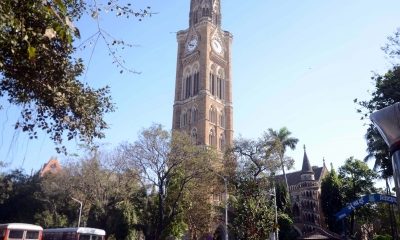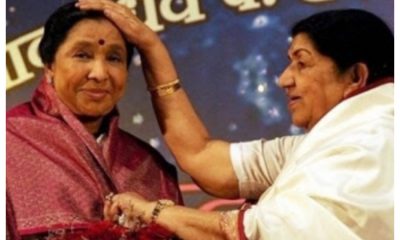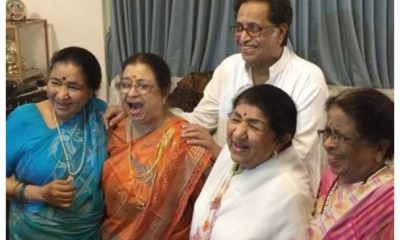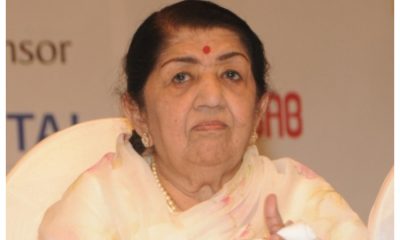Bollywood
Lata Mangeshkar, the ageless voice of India, passes away at 92
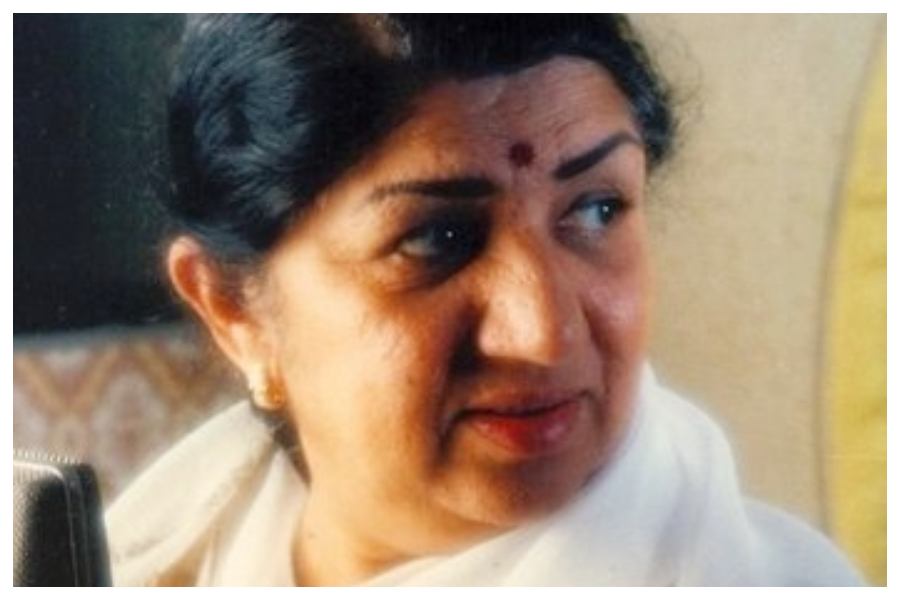
Lata Mangeshkar, India’s most loved singer who had once moved Pandit Jawaharlal Nehru to tears, leaves behind a teary-eyed nation of admirers who grew up listening to her immutable voice give wings to the words of poets and the screen careers of legions of heroines.
India’s Melody Queen, who also composed music for Marathi films and was a producer as well, and had the distinction of being conferred with the highest civilian honours of India and France, passed away on Sunday morning at the Breach Candy Hospital in Mumbai, where she had been admitted because of Covid-related complications on January 11.
Lata Didi, as she was known among her family and followers, was 92 and is survived by her siblings — playback singer and composer Meena Khadilkar, popular singer and restaurateur Asha Bhosale, singer Usha Mangeshkar, and music director Hridayanath Mangeshkar.
She never married, but was close to the late Raj Singh Dungarpur, the aristocratic former cricketer and President of the Board of Control for Cricket in India (BCCI) from 1996 to 1999.
One of India’s most loved voices, Lata Mangeshkar was the recipient of three National Film Awards, seven Filmfare awards, and of course, the Dadasaheb Phalke Award in 1989. She was conferred the Bharat Ratna in 2001, becoming the second singer after M.S. Subbulakshmi to be so honoured, and the French awarded her the Officer of the Legion of Honour.
In 1974, Lata Mangeshkar became the first Indian to perform at the Royal Albert Hall, London. She had indeed come a long, long way since the time when the first song that she recorded for a film — ‘Kiti Hasaal’ in 1942 — was dropped in the final cut.
Born in what was then the princely state of Indore on September 28, 1929, to the classical singer, Marathi theatre actor and writer of musical plays Deenanath Mangeshkar and his wife Shevanti (Shudhamati), Lata Mangeshkar was originally named Hema by her parents, but they later changed it to Lata after the character Latika from one of her father’s musical plays.
Lata Mangeshkar’s association with the performing arts began when she was five and started appearing in her father’s musical plays, and it continued even after her father’s premature death in 1942, thanks to his good friend, the actor and director Master Vinayak (Vinayak Damodar Karnataki), who took the family under his wings.
It was Master Vinayak who took Lata Mangeshkar to Mumbai, paved her way into the world of Marathi cinema, got her to take Hindustani classical music lessons from Ustad Aman Ali Khan of the Bhendi Bazaar Gharana, and introduced her to Vasant Desai, V. Shantaram’s favourite music composer.
But it was not until Master Vinayak’s death in 1948 that the struggling singer-actor found the person whom she considered to be her “godfather” — the music composer Ghulam Haider, who gave Lata Mangeshkar her first big break with the song ‘Dil Mera Toda, Mujhe Kahin Ka Na Chhora’ in the movie ‘Majboor’ (1948). It was her first big break.
Haider took his protege to Shashadhar Mukherjee, the Filmistan boss now better known as Kajol and Rani Mukherjee’s grandfather, for his film, ‘Shaheed’ (1948), but he turned her down because he found her voice to be “too thin”.
Lata Mangeshkar proved him oh-so wrong just a year later when her song ‘Aayega Aanewaala’, filmed on the gorgeous Madhubala in Kamal Amrohi’s debut directorial, ‘Mahal’ (1949), became an ageless hit.
And in one of life’s delicious ironies, Mukherjee’s grand-daughter lip-synced the ‘Dilwale Dulhania Le Jayenge’ song, ‘Mere Khwabon Mein’, which was sung by none other than Lata Mangeshkar, as well as the other numbers picturised on her and Shah Rukh Khan.
Since ‘Mahal’, Lata Mangeshkar was courted by just about every music director of note — from Anil Biswas to S.D. Burman (and his son Rahul Dev, whose first and last song she sang), Naushad (who had asked her to sing like the then reigning nightingale, Noorjehan), Madan Mohan, Shankar-Jaikishan, Laxmikant-Pyarelal (for whom she’s said to have sung 700 songs in 35 years), and Kalyanji-Anandji.
And she worked with every contemporary composer of note — from Anand-Milind, sons of Chitragupt, with whom she had also worked, and Anu Malik, Sardar Malik’s son, to Ilaiyaraaja and A.R. Rahman. It is said she worked with music directors from 13 states in her star-studded career.
After Noorjehan moved to Pakistan, Lata Mangeshkar became the go-to playback singer for every film producer and music composer. She did not disappoint them.
Lata Mangeshkar lent her voice to an endless succession of chart-topping numbers in Hindi cinema, from ‘Allah Tero Naam’ and ‘Rangeela Re’ to the ‘Satyam Shivam Sundaram’ title track, to ‘Lukka Chuppi’ in ‘Rang De Basanti’, apart from songs in Marathi (she also composed the music for several Marathi films in her ‘Anandghan’ avatar), Bengali, Tamil, Kannada, Malayalam, and Sinhala.
In 1974, the Guinness Book of Records listed Lata Mangeshkar as the most recorded artiste in human history, stating that she had recorded “not less than 25,000 solo, duet and chorus-backed songs in 20 Indian languages” between 1948 and 1974. The claim was contested by her long-time rival, Mohammad Rafi, who claimed to have sung around 28,000 songs.
After Rafi’s death, the Guinness Book in its 1984 edition listed Lata Mangeshkar in its entry for ‘Most Recordings’, but it also recorded Rafi’s claim. Later editions of the Guinness Book said Lata Mangeshkar had sung no less than 30,000 songs from 1948 to 1987.
For 73 years, from 1943 to 2015, when she recorded her last song for a film (the Indo-Norwegian production, ‘Dunno Y2…Life Is A Moment’, which was all about gay love), Lata Mangeshkar commanded a fan following and an inimitable reputation with not many parallels in the Indian performing arts.
The late Yash Chopra, who was one of Lata Mangeshkar’s favourite directors, said in an article he had penned for BBC.com on the occasion of the singer’s 75th birthday (not longer after she had sung the famous ‘Veer Zaara’ song, ‘Tere Liye Hum Hain Jiye’, with Roop Kumar Rathod): “I see God’s blessing in her voice.” We are blessed to have that voice live with us forever.
Bollywood
Mahima Chaudhry & Sanjay Mishra’s ‘Durlabh Prasad Ki Dusri Shadi’ to be out on December 19
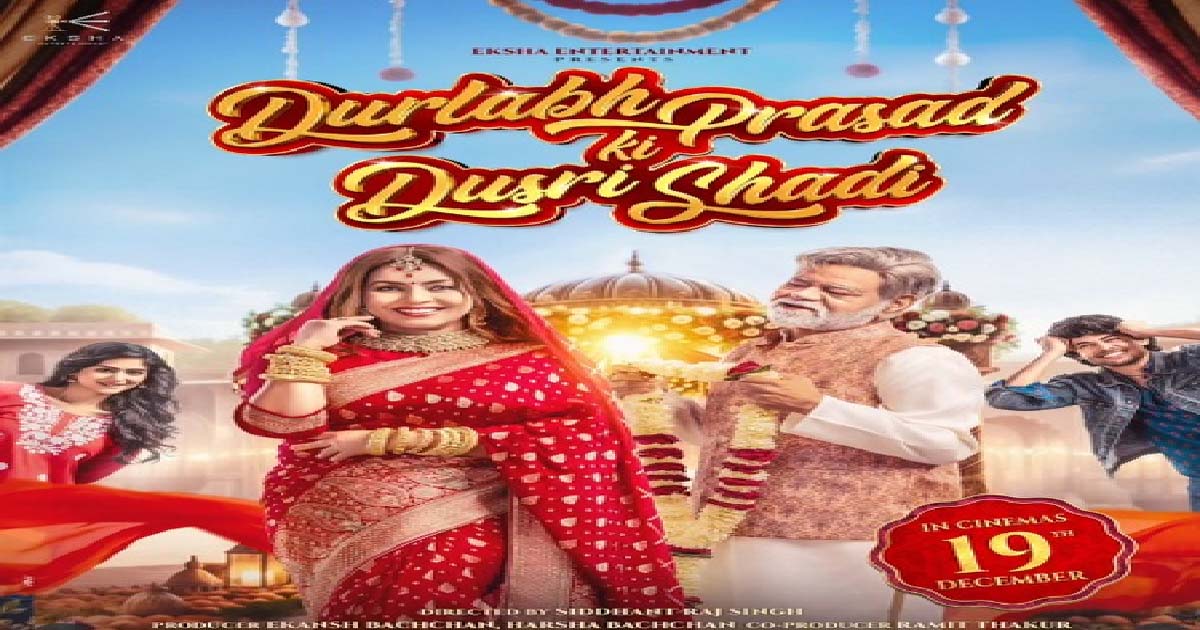
Mumbai, Nov 17: The makers of Mahima Chaudhry and Sanjay Mishra’s forthcoming romantic entertainer “Durlabh Prasad Ki Dusri Shadi” have finally announced the release date for the film. The drama has been locked to be out in the cinema halls on December 19 this year.
The announcement poster showed groom Sanjay lovingly looking at Mahima, who is dressed as a bride, with a garland in his hand.
Both Mahima and Sanjay were seen blushing in a post captioned, “The wedding bells are ringing! (Bell emoji) Get ready to celebrate love, family, and second chances. #DurlabhPrasadKiDusriShadi is coming to the big screen on 19th DECEMBER. (sic).”
“Durlabh Prasad Ki Dusri Shaadi” has been made under the direction of Siddhant Raj Singh. The project shares the tale of a young man who embarks on a desperate mission to find a new bride for his widowed father, after facing immense pressure from his prospective in-laws to have a woman in the house before they send their daughter.
The core cast of the drama also features Vyom Yadav, Palak Lalwani, Pravin Singh Sisodia, and Shrikant Verma in key roles, along with others.
Sharing why this character holds a special place for him, Sanjay revealed in a statement, “Durlabh Prasad is a character you’ll love for his simplicity and innocence. Comedy with emotion is always special, and this film has both in abundance. I’m excited for audiences to meet this unique dulha and his equally unique journey.”
Previously, Sanjay took to social media and posted the first look poster from the movie, along with the caption, “The bride has been found, get ready now, because the barat will be coming soon, from theaters near you or far. #DurlabhPrasadKiDusriShadi releasing in cinemas soon! (sic).”
The poster features a close-up of Mahima as a glowing bride, while Sanjay poses as an unconventional Dulha. He is seen holding a photo frame of the bride instead of the real bride herself.
Bollywood
Farah Khan says ‘enjoy this beautiful phase’ as Rajkummar Rao & Patralekhaa welcome their baby girl

Mumbai, Nov 15: Filmmaker and choreographer Farah Khan congratulated the new parents on the block, Rajkummar Rao and Patralekhaa, as they welcomed their first child, a baby girl, on Saturday.
Dropping a couple of lovely photos from Patralekhaa’s baby shower on social media, Farah advised Rajkummar and Patralekhaa to enjoy this beautiful phase of their life.
Taking to her official Instagram handle, Farah wrote, “The Baby is here!! Congratulations @patralekhaa n @rajkummar_rao .. enjoy this beautiful phase of life (sparkling heart emojis) n remember for any baby advice.. main hoon na.. (winking face with tongue emoji) (sic).”
“p.s.- @iamhumaq luckily we just about did the baby shower in time (face with tears of joy emoji),” she added.
The images show the couple twinning in yellow as they posed in the middle of a cake, balloons, and a giant teddy bear.
Rajkummar and Patralekhaa made the happy announcement on social media with a sweet Insta post that read, “We are over the moon God has blessed us with a Baby girl…Blessed parents Patralekhaa and Rajkumaar(sic).”
“(red heart and folded hands emoji) The greatest blessing God has given us on our 4th wedding anniversary. (sic),” they captioned the joint post.
Several big names from Bollywood congratulated the new parents in the comment section.
Actor Varun Dhawan commented, “(red heart emoji) welcome to the club guys@(red heart emoji)”
Actress Neha Dhupia said, “Congratulations you guys (red heart emojis) welcome to the best hood … parenthood(red heart emoji).”
Actor Ali Fazal shared, “Oh my goddddd!!!! So so happy to hear this . Congratulations you two beautiful people. Mubaarak…(red heart emojis).”
Rajkummar and Patralekhaa announced their first pregnancy back in July this year.
The couple uploaded a joint post on their official Instagram accounts saying, “Baby on the way – Patralekhaa & Rajkummar (sic).”
Bollywood
Tabu’s Bold Ramp Walk For Abu Jani Sandeep Khosla In Black Cape Steals The Show At Fashion Event In Mumbai
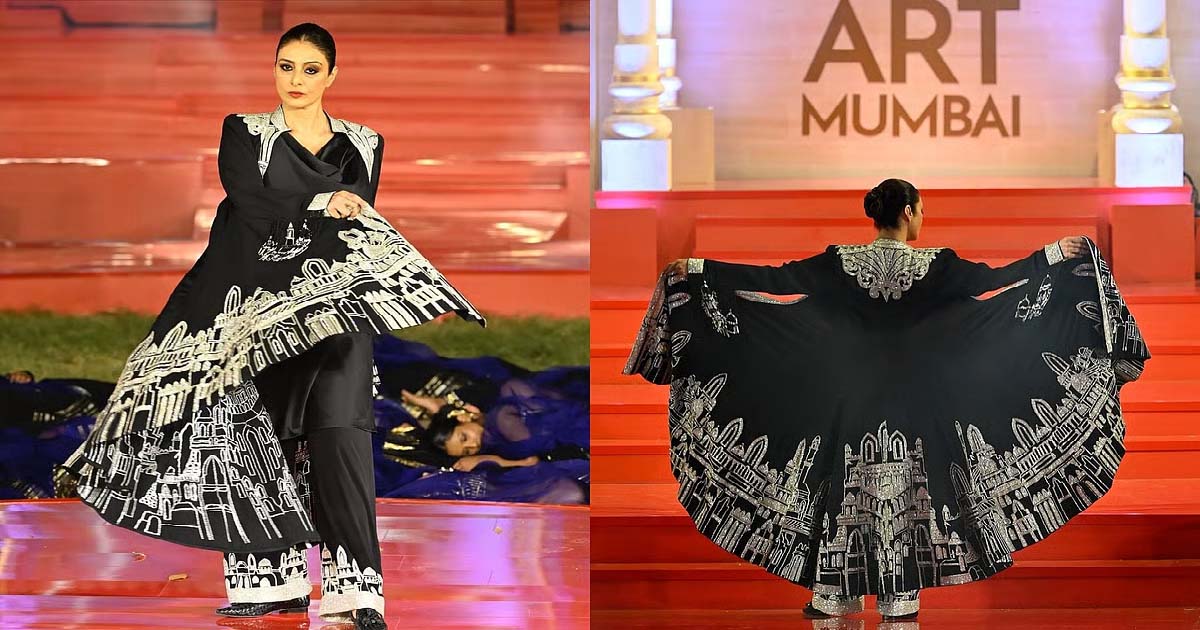
Bollywood star Tabu once again showcased that style truly transcends age as she turned showstopper for the celebrated designer duo Abu Jani Sandeep Khosla. Her commanding runway presence-sharp posture, confident stride, and fierce gaze, left the audience spellbound.
The 54-year-old actor, who celebrated her birthday on November 4, made a powerful statement in a monochrome ensemble. She wore parallel black trousers, a cowl-neck tunic, and a long architectural jacket embellished with luxurious silver crystals and intricate hand embroidery. The outfit beautifully blended Indian craftsmanship with contemporary glamour.
Her styling elevated the drama- a sleek high bun, bold red lipstick, and intense kohl-lined eyes added to her striking aura. Tabu completed her look with classic shiny black loafers, perfectly balancing comfort and timeless elegance.
Abu Jani Sandeep Khosla shared stunning photos of Tabu from the event on Instagram, describing the show’s theme as “A Thousand and One Nights”, imagined through nocturnal celebration and opulence.
The designers highlighted that the coat was a reinvented edition of their maximal signature piece, featuring thousands of sequins hand-embroidered on a black base, crafted from pure chamois satin and crepe de chine.
The show was attended by prominent Bollywood names including Jaya Bachchan, Neetu Kapoor, and Soni Razdan, who cheered on as Tabu lit up the runway.
The comments section quickly filled with admiration, with fans calling her “regal,” “stunning,” “gorgeous” and “fantabulous.” Many applauded her effortless grace and ability to deliver unforgettable style moments every single time she steps into the spotlight.
From red carpets to high-fashion ramps, Tabu continues to prove why she remains one of Bollywood’s most respected and celebrated fashion icons. Her latest showstopper moment reinforces that confidence, craft, and elegance are her signature style, always age-defying and always iconic.
-

 Crime3 years ago
Crime3 years agoClass 10 student jumps to death in Jaipur
-

 Maharashtra1 year ago
Maharashtra1 year agoMumbai Local Train Update: Central Railway’s New Timetable Comes Into Effect; Check Full List Of Revised Timings & Stations
-

 Maharashtra1 year ago
Maharashtra1 year agoMumbai To Go Toll-Free Tonight! Maharashtra Govt Announces Complete Toll Waiver For Light Motor Vehicles At All 5 Entry Points Of City
-

 Maharashtra1 year ago
Maharashtra1 year agoFalse photo of Imtiaz Jaleel’s rally, exposing the fooling conspiracy
-

 National News1 year ago
National News1 year agoMinistry of Railways rolls out Special Drive 4.0 with focus on digitisation, cleanliness, inclusiveness and grievance redressal
-

 Maharashtra1 year ago
Maharashtra1 year agoMaharashtra Elections 2024: Mumbai Metro & BEST Services Extended Till Midnight On Voting Day
-

 National News1 year ago
National News1 year agoJ&K: 4 Jawans Killed, 28 Injured After Bus Carrying BSF Personnel For Poll Duty Falls Into Gorge In Budgam; Terrifying Visuals Surface
-

 Crime1 year ago
Crime1 year agoBaba Siddique Murder: Mumbai Police Unable To Get Lawrence Bishnoi Custody Due To Home Ministry Order, Says Report



